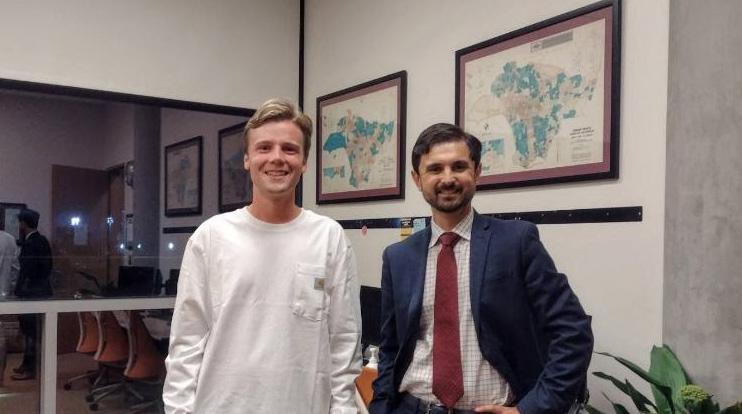
2 minute read
Alumni Spotlight
NICOLAS HEIDORN ’06
by Katherine Jackson ’25
Nicolas, shown here on the right, with Marshall Bessey ’23 prior to his talk at the MMC Athenaeum on September 28. PHOTO COURTESY OF BIPASA NADON
Nicolas Heidorn is the founder of Heidorn Consulting, a firm that specializes in state and local policy and advocacy. He was formerly the Policy Director for California Common Cause, where he led the organization’s legislative advocacy in Sacramento. He was also the founder and Director of the California Local Redistricting Project, which was a joint Common Cause‐ McGeorge School of Law effort to promote local redistricting best practices. He has over a decade of experience advocating for voting and governance reforms, particularly in local government. He drafted Senate Bill 1108 (Allen, 2016), which for the first time authorized all California general law cities and counties to adopt independent citizens redistricting commissions, and has assisted several jurisdictions in setting up their own local commissions. Representing Common Cause, he was also part of the coalition that passed Assembly Bill 849 (Bonta, 2019), which adopted new criteria and public engagement requirements for city and county redistricting.
Prior to joining Common Cause, Heidorn served as Assistant General Counsel at the California Environmental Protection Agency, a position he was appointed to by Governor Brown in 2013. Before that, he worked in the State Legislature for State Senator Mark Ridley‐Thomas and on the Proposition 11 campaign, which established California’s state Citizens Redistricting Commission.
What skills that you developed as a Student Research Assistant at the Rose Institute have you used in your career?
One thing that has always stood out to me from my time at the Rose Institute was the level of meticulousness that went into our studies. I did some work on the KosmontRose Institute Cost of Doing Business Survey, and I remember the detail that went into describing the different taxes, fees, and other costs of running a business for each of the surveyed municipalities. This type of broad survey work is really important for identifying best practices and also demonstrating what practical effects can flow from olicy choices. Later in my career, somewhat inspired by the Kosmont, I would write and publish the California Municipal Democracy Index, which was a comprehensive survey of the election and campaign finance practices of all 482 cities in California. I think the Rose gives students a good appreciation for how to collect, organize, interpret, and present data, which is an invaluable skill set for anyone looking to work in public policy.
What were the greatest challenges in founding your consulting firm?
There are many benefits to policy consulting, especially greater flexibility with your schedule and the ability to drill down into issue areas that interest you. The hardest part of consulting is building a consistent book of business and also being diligent in choosing which clients to partner with. I’ve been fortunate that my consulting work has mostly stayed within the areas of elections and campaign finance reform and I’ve gotten to work with great organizations that share my commitment to building a stronger democracy.
Your professional life has always been connected to state and local government. What originally interested you in state and local government, and how has this interest grown?
I first became interested in state government after taking Professor Miller’s California Politics class. In fact,









